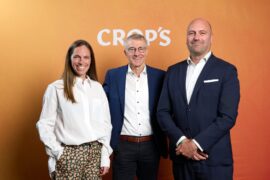Feltham, England-headquartered Nomad Foods, producer and marketer of Birds Eye, Findus and iglo frozen food products, has partnered with the Innoget global innovation network to launch an Open Innovation Portal (www.nomad-foodsopeninnovation.innoget.com/) that invites partners to share new solutions that could be scaled to help shape the future of food and support more sustainable diets, covering areas such as increasing the use of mussel and bivalve proteins in everyday diets and sustainable packaging.
The portal is open to academics, subject experts, start-up enterprises and SMEs with the goal of developing exciting new partnerships spanning from the ideation phase through to product development and eventually, launch to market. Activities will include co-developing product solutions, consumer testing, facility testing and funding or building new ecosystems, focused initially on four key areas:
•Scalability of frozen mussels and other bivalve products
•Recyclability solutions for products that are currently in multi-material, non-recyclable vacuum packaging
•Solutions to enable recyclable paper-based meal trays or bowl packaging to be used for frozen foods
•Clean label replacements that that replicate the functional properties of methylcellulose in food applications
“Consumer demand for nutritious, high-quality, sustainable food and sustainable packaging solutions is growing and the role of technology in delivering these needs is accelerating,” said Nomad Foods CEO Stéfan Descheemaeke. “We are very fortunate to have a world class in-house R&D team and a growing number of partnerships in the food tech space including our cell-cultured fish collaboration with BlueNalu. Our new Open Innovation Portal will help us to unlock the potential we see in important areas such as alternative protein as we play our part in helping to deliver a more sustainable food system.”
Dr. Stella Peace, Nomad Foods’ chief research and development and quality officer, commented: “We believe that great innovation goes together with collaboration and the scale of the challenges facing the food industry today will require partnership if we are to meet evolving consumer needs and our ambitious environmental commitments. As the clear category leader, we are proud to be working on new innovations that consumers will love and that could help to resolve some of the key challenges facing the food industry today.”

She added: “The launch of our portal builds on work already underway to expand the use of mussel meat and other bivalve proteins to everyday meal occasions within the next two to three years. Since 2021, my team has partnered with scientists David Willer, David C. Aldridge and the University of Cambridge to research whether bivalves (clams, mussels, scallops and oysters) could be used at scale as a healthy, sustainable alternative protein source due to their wide availability and ability to absorb carbon. It’s exciting to think that the humble mussel could be one of our climate change heroes!”
Nomad Foods’ brands have a long association with innovation. The Birds Eye brand was one of the first companies to ever freeze food and, more recently, Nomad Foods has pioneered products such as the Fishless Finger as part of its Green Cuisine range – the fastest growing meat-free frozen brand in Europe. In addition, the company is collaborating with a range of external partners, such as Map of Ag, in the continued development of increasingly sustainable and optimized agricultural practices, from satellite scanning of crops to maximizing carbon capture in the pea production process.
Last year Nomad Foods announced a partnership with BlueNalu to explore the potential for cell-cultured seafood (seafood derived directly from fish cells) in Europe.





